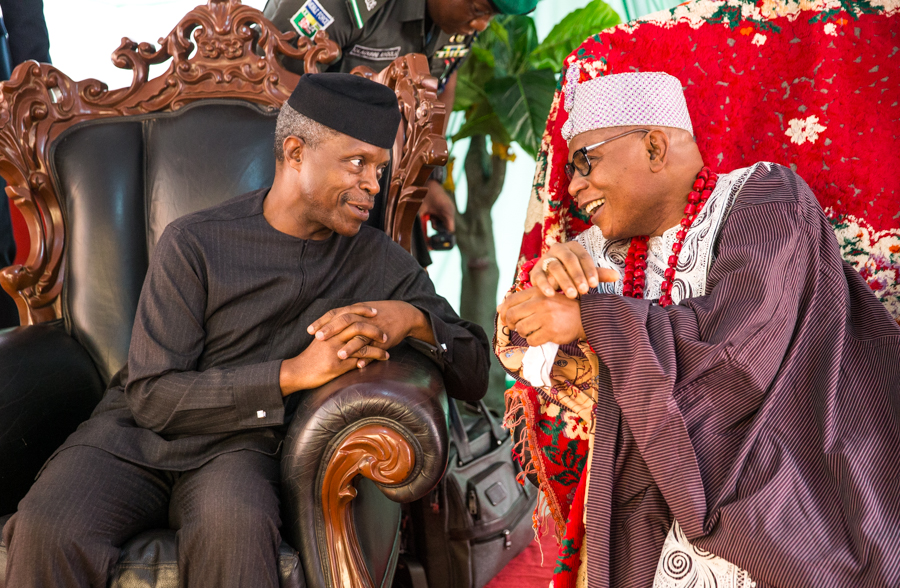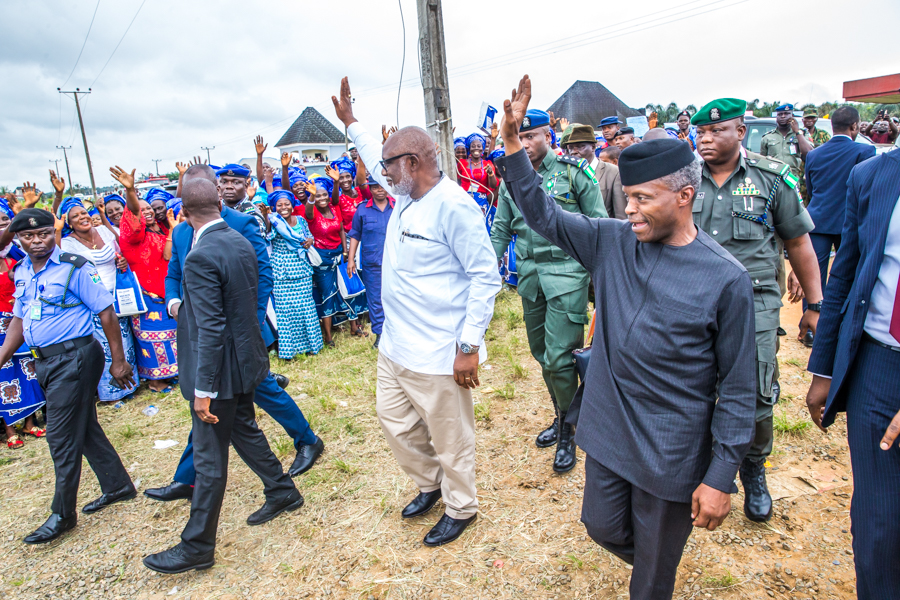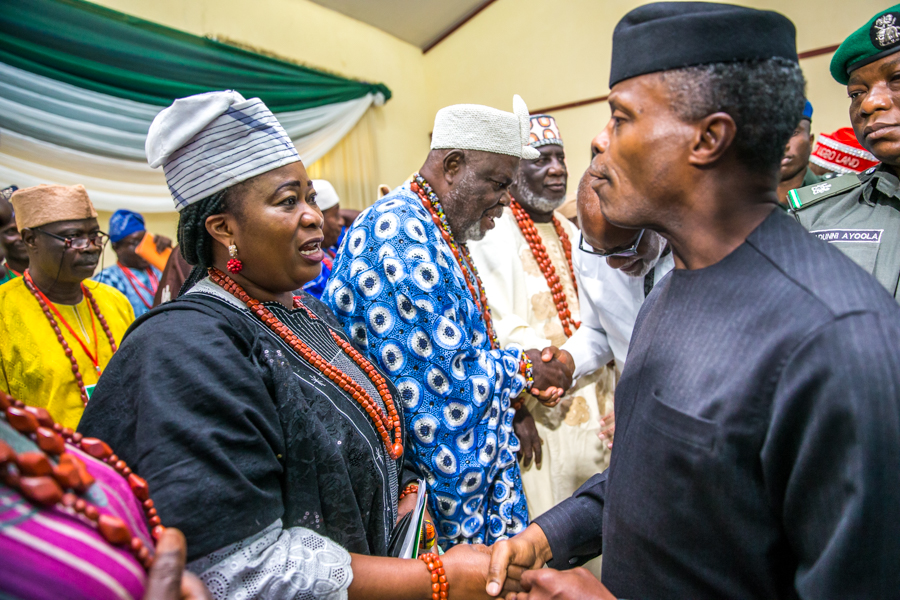2nd National Council On The Niger Delta
Buhari administration committed to fulfilling its promise to develop the Niger Delta – VP Osinbajo
*In the future that we envision for the Niger Delta, the region will no longer be regarded as a byword for environmental degradation and youth restiveness but instead as a model for environmental and economic recovery and development – VP Osinbajo
SPEECH BY HIS EXCELLENCY VICE PRESIDENT YEMI OSINBAJO, SAN, GCON, VICE PRESIDENT, FEDERAL REPUBLIC OF NIGERIA, AT THE 2ND NATIONAL COUNCIL ON THE NIGER DELTA, ON TUESDAY, SEPTEMBER 12, 2017, IN AKURE, ONDO STATE
PROTOCOL
First, let me express our gratitude to the Government and people of Ondo State for agreeing to host this Council, and for the wonderful hospitality that they have shown to us since we arrived. I must thank my brother (Governor of Ondo State, Arakunrin Oluwarotimi Akeredolu, SAN) and to say that if this is the sort of hospitality we expect, we will be back very soon.
I am glad that this meeting of the National Council on the Niger Delta is holding in Ondo State, a Niger Delta state that many people do not readily associate with the Niger Delta, or even with oil and gas at all. But I think it is important to note that this state has the second largest deposit of bitumen in the entire world, second only to Canada. So, it is, in every respect, a hydrocarbon-rich state, and, of course, eminently qualified by geographical location that is so significant to be regarded as part of the Niger Delta. So, I believe that holding this meeting here will go a long way in engendering a sense of belonging here, as well as highlighting the breadth of the region’s cultural and geographical diversity.
Indeed, the Niger Delta is a unique region, in several ways. Besides its significance as an economic zone, providing all of the crude oil that accounts for most of our foreign exchange earnings, it is also ecologically remarkable, being one of the largest wetlands and most biodiverse regions in the world.
There is also the region’s linguistic and cultural diversity, which I have personally had cause to appreciate more deeply in recent months, as I have toured the Niger Delta states. And I want to say that, in the course of that tour, not only have I been exposed to the renowned hospitality of the Niger Delta, but also I have been provided with a great insight into the nature of the challenges that this region faces and has faced through the decades.
This is exactly the reason why the President, Commander-in-Chief of the Armed Forces, Muhammadu Buhari, asked me to go on these series of tours around the Niger Delta, engaging with the local communities, engaging with the leadership of the Niger Delta.
All of the tours have strengthened our resolve as a government to give prompt attention to the affairs of the region. We fully intend to break away from the legacy of broken promises and failed interventions that we inherited when we took over the office. I understand that in the nine years since the establishment of the Ministry of Niger Delta Affairs, this is only the second convening of this National Council, the first one being in 2013. We intend to fully restore this Council to exercise its mandate as a vehicle for partnership and collaboration for the development of the Niger Delta region.
The people of the Niger Delta do not expect our pity or sympathies; what they want, and what they deserve, is the fulfilment of the decades of promises that have been made to them. What they ask for is to be given an opportunity to fulfil the immense potential of their region; and to enjoy the peace, security and development that our constitution guarantees them as citizens of Nigeria.
And this is exactly what the Buhari administration is focused on achieving. For us, the development of the Niger Delta region is not optional. Right from the President’s inauguration speech, he has emphasized this administration’s commitment to investing in the development of the Niger Delta. We have worked hard to match our words with action, extending a firm hand of fellowship to the Niger Delta, based on the conviction that there can be no development without peace and security.
In November 2016, President Buhari met with the leaders of the Niger Delta region, assembled as the Pan Niger Delta Forum, PANDEF. Since then I have followed up by travelling extensively throughout the region, on behalf of the President, meeting communities and stakeholders, and listening to their concerns and grievances. All of these conversations and feedback have gone into shaping what we have described as the New Vision for the Niger Delta.
I have listened and learned a lot, and I have also had a chance to explain in detail our vision for the Niger Delta region. I must say that these interactions and engagements have formed some of the highlights of the work of our administration this year.
Part of the outcome of our feedback gathering process is the establishment of an Inter-Ministerial Committee on the Niger Delta, which I chair, and of which the Honourable Minister is the Vice Chairman. That Committee has produced a draft Strategic Implementation Work Plan, which outlines in detail the development projects planned or already being implemented in the Niger Delta by our Ministries, Departments and Agencies, by oil companies, the private sector, and other stakeholders.
The Strategic Implementation Work Plan is a work-in-progress; undergoing constant fine-tuning. But this kind of consistent engagement – listening and learning – is a prerequisite for progress and development in the Niger Delta.
Also in 2016, we launched the Ogoni clean-up five years after the United Nations report laid the foundation for it. Let me assure you that the Ogoni clean-up is very much on course, and if things appear to be moving at a slower pace than anticipated, it is for this simple reason that we have learnt from the errors of the past when ambitious schemes were pursued without putting in place the right foundation. The right foundation will take time, as well as a robust regard for due process. We will not settle for shortcuts and quick fixes just because we want to be seen to be working. Instead, we will take our time to do the right thing and respectfully ask for your continuing patience and understanding. I would like to say that it is not just about the Ogoni clean-up, it is about the clean-up of the entire polluted portions of the Niger Delta.
The Hydrocarbon Pollution Remediation Project (HYPREP) is currently carrying out a sensitization of communities on the benefits of the remediation and restoration of livelihood, as well as training young scientists in the region who will serve as manpower for the supervision of the demonstration sites opened already in the communities.
The Niger Delta Amnesty Programme, which was originally scheduled to end in December 2015, has not only been extended, but we have also committed additional resources – an extra N35 billion was added in 2016 alone, and, of course, in the 2017 budget, and in the forthcoming 2018 budget – for greater impact in the lives of its beneficiaries.
The Presidential Economic Diversification Initiative (PEDI), spearheaded by the Ministry of Niger Delta Affairs, and focused on mobilizing private capital to revive moribund industries; especially in the agricultural value chain, is kicking off here in the Niger Delta. Interestingly, the inaugural Investment Forum of the Initiative took place a few months ago here in Ondo State.
The cocoa, rubber and oil palm plantations being targeted by PEDI were once the mainstay of Nigeria’s regional economies, providing much-needed taxes and revenues to government, and creating the jobs and prosperity that sustained generations of Nigerian farmers, merchants, transporters and factory workers.
As you are all aware, one of our plans for the Niger Delta is to support the establishment of privately-owned modular refineries. Many of the licenses handed out by previous administrations have since expired. The biggest challenge that these licensees have been facing has been funding, and as a government that is committed to enabling the private sector, we are now working on the creation of a Refinery Infrastructure Development Fund (RIDF) to support these investors.
Now, the Modular Refinery project is supposed to be private sector-led, but with the collaboration of the Federal Government and the state governments. We have done a fair amount of work on these modular refineries; we have released the guidelines for the establishment of modular refineries. I’ve met several interested parties from various parts of the Niger Delta region with their investors and in some cases with the state governors. This is a project that we are committed to, these series of modular refineries. We want to urge the state governments also to work with the local communities so that there are all kinds of commercially viable plants that will be useful in sustaining modular refineries when they are eventually established.
In addition, we are training young people who were previously involved in artisanal refining on alternative means of livelihood, including skills that will enable them to participate in the modular refining when it takes off.
I’m pleased to announce also that the Federal Government has initiated the immediate release of the sum of two (2) billion naira for the take-off of the Maritime University in Okerenkoko, Delta State. That university will take off next month in October. We believe that as soon as it takes off, of course, academic activities, engagement and all of that, will go on.
We are going to reorganize the Niger Delta Development Commission (NDDC) to enable it to effectively play its vital role in the region. This new invigorated NDDC has since read the riot act to all contractors who have abandoned the infrastructure projects awarded to them. In this and many other ways, we are confident that it will quickly make its positive impact felt in the lives of ordinary citizens. Of course, we have been introduced already to the chairman of the NDDC, distinguished Senator Victor Udoma-Egba, SAN, and the managing director, both of whom have shown tremendous commitment to the work that the NDDC is mandated to do by law.
A comprehensive range of programmes and initiatives will help ensure that the people of the Niger Delta maximally benefit from the wealth of their land. And it is my hope that this 2nd National Council on the Niger Delta will help deepen and strengthen our collective efforts so far towards the development of the region.
It should also provide an avenue to reflect on the journey so far and review progress made since the last Council meeting in Uyo in 2013; as well as refine the vision in line with the evolving expectations of all stakeholders.
Very importantly, also, the Council provides a platform for the necessary alignment of the various programmes and policy initiatives within the Federal Government, and between the Federal Government and the state governments. The synergy that results will not only help avoid wasteful duplication of efforts but also multiply the impact of every Naira invested in the Niger Delta.
Earlier I noted that the ultimate objective of our New Vision for the Niger Delta is to ensure that the people of the Niger Delta maximally benefit from the wealth of their land. When we speak of the wealth of the Niger Delta, the default assumption is that this wealth is only crude oil, but that is not so. Let me clarify that this wealth extends well beyond the crude oil that the region has in abundance. The wealth of the Niger Delta includes its agricultural, industrial, environmental and cultural potential. Even more significant is the human dimension of this potential, the intellectual and entrepreneurial energy and the talents of the millions of people who call this region home.
In the future that we envision for the Niger Delta, the region will no longer be regarded as a byword for environmental degradation and youth restiveness, but instead as a model for environmental and economic recovery and development.
The truth is that, when we continue to follow the trend, it is obvious that oil is not going to last forever. As a matter of fact, everything that we see and studies show that oil is declining very quickly in relevance. Who knew that in a few short years America, which used to be our largest importer of petroleum, no longer imports even a drop of oil. The Asian countries that import our oil today are all in search of replacements for oil. That is why Japan and China, some of the big economies, including India, these nations that take oil, are now developing electric cars. In fact, Japan has more electric charging stations than petrol stations. China has more electric cars than any other in the world. And a lot of European countries are setting deadlines for not using hydro-carbon run cars anymore.
The future of oil is in decline, that is why it is the duty of the Niger Delta region, especially the leadership of the Niger Delta region, not only to exploit this oil opportunity now, and to ensure that we are not constantly battling about security, but that we use the resources now, because if we don’t use those resources now, the resources are not going to be of great use to us in 10, 20 years from now.
And it is the duty of the leadership of the present to provide for the future. I believe that it is the great responsibility of this Council to ensure that we provide that roadmap for the future; a future that will not necessarily depend on oil, because the Niger Delta is one of the richest and most bio-diverse regions in the entire planet. And there is absolutely no reason why we should not be able to develop all of the potentials of the region.
I have no doubt that with the application of determination and sincerity of purpose, the full potential of the Niger Delta will be fulfilled, and our collective vision for it will be realized.
As a Federal Government, we will be your active partners every step of the way. And I want to say that the government of President Muhammadu Buhari is completely committed to ensuring that the Niger Delta gets justice, equity and all that it deserves, especially as it provides for this nation the revenue that it uses for development.
I thank my dear brother again for the hospitality. I thank you all very much for listening, and I wish you successful deliberations even as you round off your proceedings.
Thank you very much.
Indeed, the Niger Delta is a unique region, in several ways. Beside its significance as an economic zone, providing all of the crude oil that accounts for most of our foreign exchange earnings, it is also ecologically remarkable, being one of the largest wetlands and most biodiverse regions in the world.




